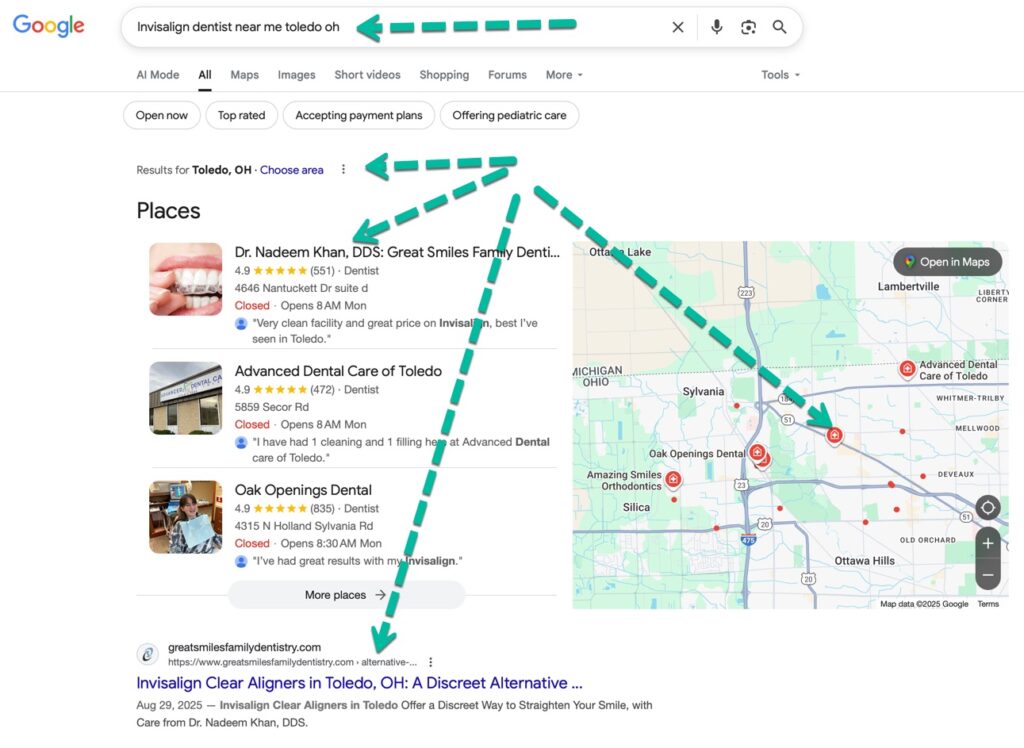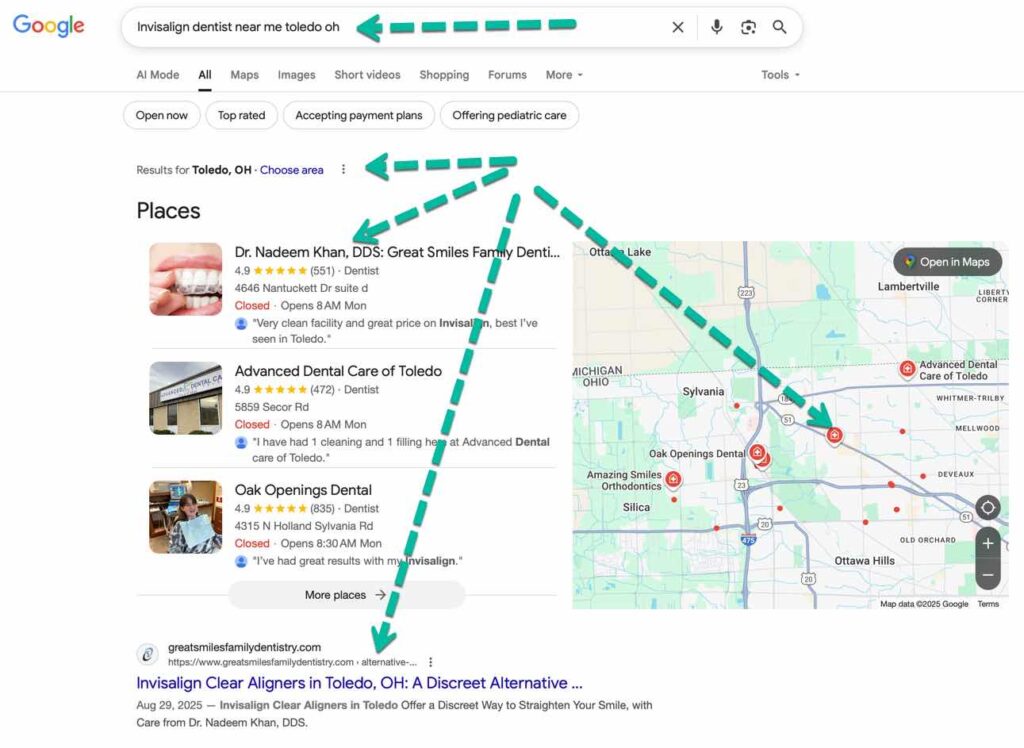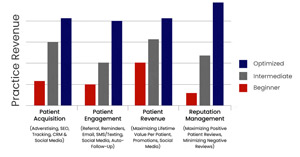Dental SEO Content Plan
Why dental SEO depends on detailed procedures knowledge and content writing skills?
For a dental practice to get constant, quality web traffic, they need to rank well in organic results (SEO) for their top keywords. While they can undoubtedly get some traffic from pay-per-click (PPC) ads, this can be costly and likely can not be maintained. Good organic rankings depend significantly on a site’s search engine optimization or SEO. Good SEO is impacted by a dental practice’s detailed knowledge of procedures and their ability to write good content their site. These two factors play a significant role in a dental practice’s SEO and its effectiveness at promoting its website.
Example of a dental SEO – Organic SEO, not paid PPC ads.


Why is dental SEO content important?
As a savvy business person, dental practice manager you want to attract all of target audiences. For example, for your successful dental practice, you would want to focus on these target audiences :
1) New potential patients
2) Existing, returning patients
3) Search engines.
4) Other providers (who will potentially refer patients to you)
5) Local PR, news agencies.
6) Your social media pages.
7) Engagement apps, like Google reviews, newsletter apps
How does SEO work for a dental website?
SEO, or search engine optimization, is the process of showing a search engine how relevant a website is to target keywords that are important to a dental practice. These keywords are peppered throughout a website’s content and will be picked up by the web crawling programs of search engines. Generally, the keywords used in SEO work will be the keywords people use when searching for an oral health choice online. If these keywords do not appear or are not placed correctly on a website, a search engine will not know that they are the appropriate choice for the users.
For example, if a potential patient needs a new dentist to provide pediatric dental services for their family, words associated with this service must be on the website. Failing to do so will not help a search engine know that when someone is looking for this service, the website should be in the top organic results. With that said, a dental practice needs to be careful not to engage in “Keyword Stuffing.” Keyword stuffing is one of several “black hat” SEO techniques that less reputable businesses and SEO companies use to boost organic rankings. “Black hat SEO” (called this because villains in old TV shows would always wear black hats) are techniques that are usually against the terms of service of a search engine and will result in organic penalties. Avoid these techniques and instead, only use “White Hat SEO” techniques. (Yes, the heroes in those same old shows would only wear white hats.)
Another aspect of selecting keywords for SEO work is the use of short-tail keywords and long-tail keywords. All SEO keywords can be sorted into these two categories. While they are related, they are the distinct and essential difference between them. It is wise and advantageous for a dental practice owner to know the difference between these two types of keywords. The attributes of a short-tail keyword and long-tail keyword are:
Short Tail Keyword
- Three words or less
- Generate higher website traffic
- Often competitive among other dental practices
- Cover large or broad topics
- Usually have low conversion rates
Long Tail Keyword
- Four words or more
- Generate lower website traffic
- Not as competitive with other dental practices
- Cover unique, specific, or narrow topics
- Usually have a higher conversion rate
Another important note about long-tail keywords is that they are becoming increasingly more important for voice search. Potential patients often use voice search when they search using a smart speaker (like Alexa or Google Home) or a digital personal assistant (like Siri or Cortana). Long-tail keywords are more often used because people use complete sentences when they ask questions to these devices. So, instead of asking “Blue Cross Dentists,” they will ask, “Who is a dentist that is currently accepting Blue Cross insurance.” If a dental practice can match those long-tail keywords and questions in their content to those searching out dental practices, they stand a chance to rank high in organic results.
Both short-tail and long-tail keywords work hand in hand to help a search engine figure out the context and relevance of a dental practice’s website.
Why is knowledge about procedures necessary for a dental practice’s SEO?
When a search engine looks at a website to determine its relevance for organic results, one factor is how authoritative it is compared to other websites. One way to show this is to demonstrate the knowledge a dental practice has regarding procedures being offered there. Using relevant and detailed knowledge about the treatments and procedures will cause a search engine to believe that a dental practice knows what they are talking about regarding oral health. Considering vast amount of knowledge and websites a search engine has categorized over the decades, it knows what words should be appearing on a site to denote their expertise. Again, these words should not be placed haphazardly throughout a website, and there should not be an attempt to stuff as many as possible into the content. These words should make sense and flow naturally throughout the website. Using these words, terms and displaying general knowledge will be helpful for search engines and important for potential patients. Patients are much savvier with their healthcare today than they have been in the past. Many bring more general knowledge with them and will appreciate it when they see detailed information about procedures.
With that in mind, a dental practice needs to check that its website does not sound like a trade paper or a research article. The terms and vocabulary they use to demonstrate their expertise can not be so overused that it does not make sense to people outside the dental industry. There needs to be a nice balance between detailed knowledge and general knowledge, so a website appeals to as many people as possible. In addition, many people may not use these complex and technical terms when searching for dentists online. Incorporating both detailed and general knowledge terms into content will help ensure that the site appeals to as many people as possible. Try to have both those who have a deep understanding of the dental industry read content and those without any to help gauge if a balance has been struck. For example, if dentists and dental assistants only read the content on a site, it may not make sense to the everyday person. If the content is only ready by those potential patients, it may look rather unprofessional to colleagues.
Why are content writing skills essential for the organic SEO ranking of a dental website?
Search engines are hungry for content. They send out web crawlers every day to review content and categorize them in their search engines to be presented as relevant results to search users. The more content a dental website has, the more attention a search engine will pay to it. “Content is King” is not just a phrase but a beneficial guideline to figure out what should be on a website. With that said, search engines do like content that is useful and relevant. Writing fluff to make a site longer without adding any value to the page’s topic will not get you the organic rankings you are looking to have for a dentist’s website. Search engine algorithms will pick up on that technique and not boost a site’s organic rankings.
A factor that plays a role in search engine rankings is the amount of time a website visitor spends on a site. The time spent on a site will naturally increase if more for a user is to read and consume on that site. A careful balance must be struck not to have too little content on a site page and not to have too much content. Much like Goldilocks and The Three Bears, the amount of content on a site needs to be “just right.” The best length is dependent on the topic, target audience, and goal of that page, but many dentists should initially aim for 500 to 1000 words for their content pages.
Another thing a search engine likes to see is unique content. Under no circumstances should a dental practice’s website cut and paste content from another site to their site. Regardless if you like the way something is written, copy and pasting content will hurt a dental practice’s organic rankings. A search engine will know who posted that content first and give that site a better ranking. Some dental practices make the mistake of copying and pasting content from their website to another website they own. For example, a dentist may own dental practices in two different towns, each with a unique URL. They may think it saves time for them to reuse content they have already written for their other dental practice’s website. It will not save time, and it could hurt the organic rankings for both sites. A search engine will have no idea that the same owner owns two dental practices. Instead, they will see one site stealing content from another site. It will devalue the content as a whole, and organic rankings will suffer.
How does content marketing help with the organic ranking of dental practices?
Content marketing is another marketing strategy that is very effective in helping the organic ranking of dental practice websites. Content marketing is often used to enhance the impact of SEO work to promote keywords for a practice. SEO work, in turn, also often benefits effective content marketing. While the length of content is essential, as mentioned above, the frequency of that content being updated is also crucial and plays a role in organic ranking.
A search engine algorithm will consider many factors when ranking websites. One factor is how often a site is updated. The more up-to-date a site is, the more relevant and authoritative it is to present as a top result. For example, if both sites have roughly 1,000 words talking about root canals, but one updated two months ago and the other two years ago, the edge will be given to the site with the more recent update. Updates to websites can take many forms, including:
- Adding new content to an already existing page
- Removing outdated content from a page, such as when a service is no longer offered
- Creating a new page with new content
- Taking a page that has grown too large and breaking it down into two or more pages
- Revising content to making minor changes such as correcting grammar are using more up to date terms
- Adding additional internal and external linking to a page
When these updates take place is also critical in content marketing. Updates to a website should be made continually throughout the year. A search engine does not care if all pages are constantly updated but rather that a part of the website is updated. As such, updates should be spread out throughout the year and not clumped together. Updating all pages at once can confuse a search engine into thinking that maybe it is an entirely new website. Incremental and partial updates to sections of the website throughout the year is a much better approach. It can be helpful for sites that have many pages to create an excel sheet and list every page a site has on it. Next to that page (which should be linked for the convenience of the dental practice), a date should be placed next to it, indicating the last time that someone looked at the page. Often, the best way to review the page is to print out the content, sit down in a quiet part of the office, and read it allowed while holding a red pen. As the owner or administrator reads the content aloud, they should note what they want to change or add to the page. Each page on a website should be reviewed once a year by someone.
Not all pages on a website will have updates, additions, or frequent revisions. For example, a page with the address, phone numbers, fax number, and hours of operation are unlikely to change year to year. A page that has recent patient reviews, on the other hand, may update every month. If a dental practice has a website that requires no updates at all, it should consider adding a monthly blog to its site. This unique content will help boost their organic rankings, keep patients on their site a little longer, and often are great things to share across social media channels or email marketing campaigns.
The experts at PatientGain.com have years of experience working with dental practices and helping them improve their overall dental SEO. Call our team today and let us show you what we have done for other dentists across the country. We all look forward to working with you to help your practice grow!


